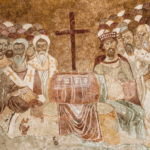It was a mixed reading year for me in 2023: many books, few standouts.
I revisited quite a few old favourites: Gorky’s Childhood Trilogy, The Lion the Witch and the Wardrobe. A slightly abridged BBC dramatisation of my favourite novel, A Month in the Country, was excellent.
Here are some miscellaneous highlights of new discoveries (in order of reading).
1. Finding God in Hollywood: Discovering the Divine in Films, Movie Stars, and Stories (Clarkson)
Nathan Clarkson’s autobiographical reflections on faith and the film industry are engaging and honest and also, finally, a bit disappointing. Clarkson offers deep insights into Hollywood, our society and his own life. He exposes lies, idols and securities that destroy our lives and points back to the only One who can give us what we really need. Yet by stopping here, he tends to give the impression that the cross is primarily a solution to our existential insecurities rather than something that reconciles us to a holy God. It’s an encouraging book, but not for its atonement theology.
2. Tomorrow, and Tomorrow, and Tomorrow (Zevin)
Tomorrow, and Tomorrow, and Tomorrow is the story of a long and troubled friendship between Sam and Sadie—gifted children, then successful computer game designers, and finally wiser adults. Zevin writes beautifully and her story is fascinating, tragic and hopeful.
3. Klara and The Sun (Ishiguro)
Ishiguro’s Klara—a sweet-natured child companion android—made this book a rich and thought-provoking pleasure. See my review to find out why this was my favourite fiction book of 2023.
4. The Coming of the Holy Spirit (Jensen)
A clear-eyed and sustained reflection on the Holy Spirit in light of Scripture, the gospel and Jesus Christ. See more in my TGCA review.
5. Self Made (Burton)
6. Selected Poems (Ai)
Ai Qing (artist Ai Wei Wei’s father) wrote these poems over the course of his turbulent life: from privilege to poverty, revolution to hard labour. The tone of his poetry ranges from righteous anger to quiet reflections. Recurring themes of exile and time reminded me of some of the poems of Bai JuYi I read in 2021.
… Lost years are like a friend; after
ties are broken and grievances pass,
you suddenly get the news: Your friend
has long since left this world.
7. The Abolition of Man (Lewis)
Prompted by Michael Ward’s recent reflections on this work, I thought I would re-read The Abolition of Man, only to find that I had only ever read a few individual chapters from it. The Abolition of Man is another example of C.S. Lewis’s strange ability to prophetically anticipate the trajectory of modernity and lay bare its danger. In an age of wars over meaning, morality and nature, The Abolition of Man is a book we should all be reading.
8. The Soul Mark (Fischer)
Jasmine Fischer continues to grow in her powers in this new fantasy series. When Sela Meriweather falls foul of the straight-laced and hypocritical authorities, she is shipped off to a (Botany-Bay-like) prison colony where she finds trials, judgement, old friends, new love, and grace. Fischer’s romantic themes would normally put her novels outside my reading gamut, but her characters, storytelling, and ability to imaginatively re-express her faith always make the journey worthwhile. I am also currently enjoying Lumen, the second of her excellent Nightingale trilogy.
9. Winters in the World: A Journey through the Anglo-Saxon Year (Parker)
In Winters in the World, medieval scholar Eleanor Parker travels through the months and seasons of pre-Norman Britain, sifting rich literary and theological treasures from the scant texts that have survived the millennium. What emerges from her study is a view of the world that is both deeply Christian and magically enchanted. The Anglo-Saxons believed that Christ was the meaning of everything, but their way of understanding the connection was often imaginative (and sometimes just superstitious). But this is the best sort of superstition, and the best use of imagination—seeking to see the world lit up by the light of Christ. As I read, I was reminded of Jonathan Edward’s attempt to see every beautiful thing in creation as a reflection of Christ’s loveliness.
Winters in the World would be a great Christmas or holiday read. Here are some lines from Parker’s translation of the Anglo-Saxon hymn “O Oriens” to make the point:
O Earendel, brightest of angels,
sent to mankind over middle-earth,
and righteous radiance of the sun,
splendid above all stars, of your own self
you ever enlighten every age.
As you, God born of God long ago,
Son of the true Father, eternally existed
without beginning in the glory of heaven,
so your own creation cry with confidence
to you now for their needs, that you send
that bright sun to us, and come yourself
to lighten those who long have lived,
surrounded by shadows and darkness, here
in everlasting night; who, shrouded by sins,
have had to endure death’s dark shadow …
This was my favourite non-fiction read for 2023, narrowly edging out The Abolition of Man. I think Lewis would have heartily approved of the preference.














